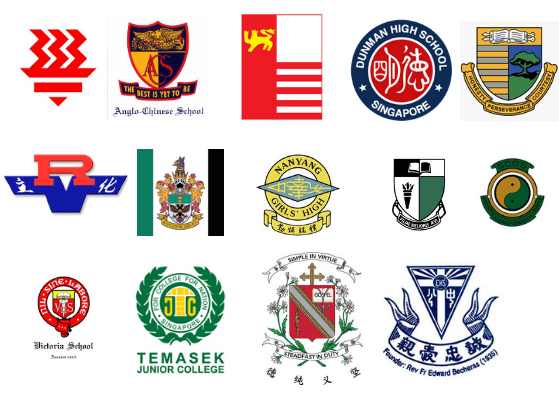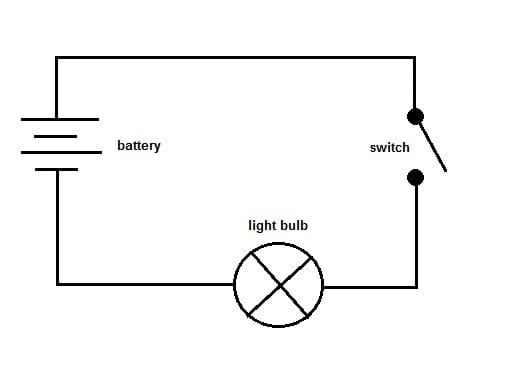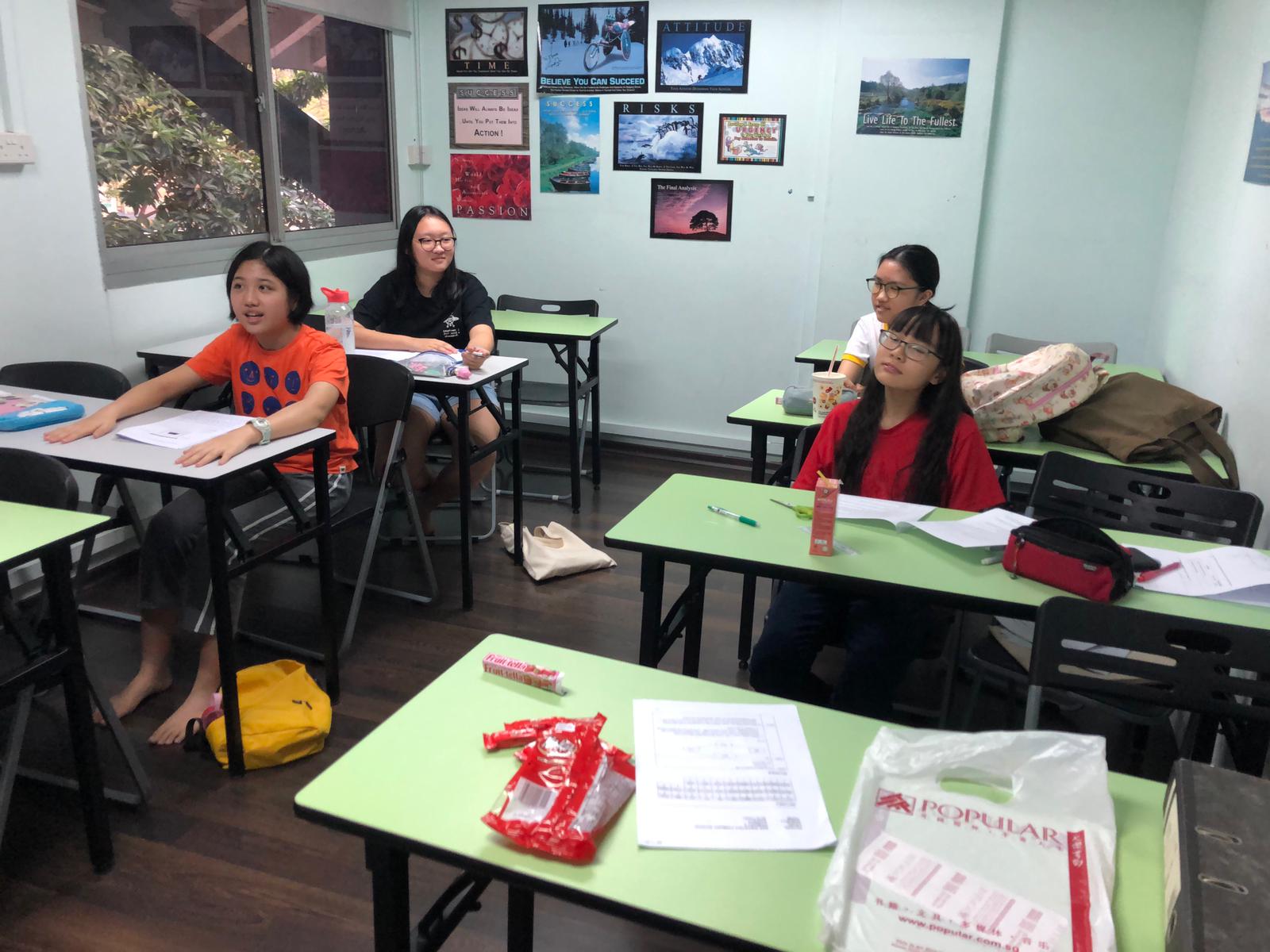Direct School Admission (DSA) students in Integrated Programme schools:
Parents of children who have been admitted into IP schools have expressed their concern to me on their anxieties, mainly whether their child will be able to cope with the rigorous educational standards of the top schools even though many of them do not meet the cutoff scores of their individual schools. I can assure you that with enough preparation, your child will be ready to meet the expectations of their IP schools and do better than their peers. I will cover this issue in the points below.
- Your child’s PSLE grade is low because of their success in the DSA interview.
Once a 12yo child is informed that he/she has been admitted into a top school before taking the PSLE, their typical response will be a sigh of relief and a more relaxed attitude towards one of the most stressful exams in Singapore. Most of my DSA students, and including my friends who have been successful in DSA applications into IP schools, have told me that the days leading up to PSLE have been stress-free, and they are able to focus more on their CCAs instead of just pure academics. This is shown in their lower PSLE scores as compared to their peers in their respective IP schools, who have been spending a lot of time hitting the ten year series as their spots in the IP schools are not secured. I assure you that if your child studied more during those days, he/she would see a significant jump in their PSLE scores as well. They are by no means lacking in terms of intelligence compared to their peers.
- There are quite a few skills or chapters covered in the PSLE that have insignificant impact on secondary school life
In the chapters of Science, only human/plant systems, forces, energy, man and his environment are tested in Secondary school. The bulk of what they learn in Primary 6, which is animal based such as environmental impact, web of life, adaptation, is completely untested at the Secondary level. For Math, the skills used in the last 20 marks of the exam, which essentially act as a gatekeeper to A* grade, are used to tackle open ended problem sums with abstract concepts. These skills may not be of great value in Secondary level Maths which focuses more on laws, procedure and presentation. In English, compositions test students on creative narrative writing, whereas Secondary level English tests them on argumentative essays, which place more importance on current affairs, and debating of key points rather than narrative and creative writing. In Secondary school, discipline and conscientiousness is more important, as compared to primary school which values open ended problem solving through problem sums and seemingly out of textbook structured question answers.
- The schools provide extra assistance to their DSA students
It should come as no surprise that the DSA students are valued members of the school as they are their representatives in CCAs. If students are taken out of class due to CCA commitments, there will be avenues for the teachers to cover those lost lessons with them again. CCAs are also expected to stand down during exam periods, especially during finals where the weightage of the exams are the highest.
That being said, DSA students should never rest on their laurels. IP is a competitive system that has sieved out most of the academically gifted children in Singapore. To do well in such an environment requires intense efforts from both parents as well as students to ensure that they do not stray from the path of academic excellence.
PSLE Science question of the week
Answer: Answer is C, plants always grow towards the sun in order to capture more sunlight for photosynthesis.
PSLE Science question of the week #2:
Athlete’s foot
Question: Student A has a medical condition in which fungus grows on his feet. The doctor advised student A to wear slippers instead of covered shoes. Explain how wearing slippers helps reduce the growth of fungus on the feet.
Option A: Wearing slippers allows the student to air his feet and prevent growth of fungus
Option B: Wearing slippers keeps the student’s feet dry, as fungus needs water to grow
Option C: Wearing slippers instead of shoes as fungus likes to grow on socks
Option D: Wearing slippers exposes the feet to the sun, and fungi do not like sunlight
Answer: Answer is B! Fungi needs water to grow, so it prefers damp environment. Wearing slippers allowed sweat to evaporate, keeping the feet dry and free of fungi.
PSLE Science question of the week #3
Question: A man used a hammer to drive a nail into a piece of wood. Which factor will NOT affect how deep the nail goes into the wood?
Option A: Mass of the man
Option B: Mass of the nail
Option C: Friction between the nail and the wood
Option D: Height at which the hammer was raised
Post your answer in the comments section below!
Answer: Answer is B, mass of the nail is unrelated to the amount of force or energy the man needs to hit the nail.
PSLE Science question of the week #4
When Student A closed the switch, the bulb blew. Which one of the following would have prevented the bulb from blowing?
Option A: Using fewer batteries
Option B: Closing the switch more quickly
Option C: Changing the direction of the switch
Option D: Changing the direction of all batteries
Answer: Answer is A! Using too many batteries can cause the bulb to fuse due to too much current flowing through the bulb, and heating up the filament.
2024 PSLE A-STAR SCIENCE PROGRAM FOR ADVANCED LEARNERS IN P6
This program is designed as a lead-up to our IP secondary classes, tutors in charge will be putting a greater emphasis on process questions instead of pure content and drilling. Tutors in charge will be our IP tutors who have been training PSLE high scorers for many years, who are graduates from schools offering the IP stream, on top of being NIE trained as well as NUS graduates
If your child is getting an A but is struggling to attain A* in PSLE science, this program will interest you. The common weakness of students who fail to achieve A* standard is the inability to handle creative open ended questions found at the end of the paper which cannot be answered using rote-learning methods, in fact, memorizing will be a detriment. This program aims to equip prospective students with the necessary skills and knowledge to confidently break down and solve such problems. Students who are aiming to attend Integrated Program(IP) with an aggregate of AL4-AL8 are strongly recommended to attend, as those schools will have very competitive Maths and Science syllabus.
Level/Subject: P6 A-Star SCIENCE
Dates: Friday
Time: 330pm – 5.00 pm
Benefits of the PSLE A-Star Science program:
-Keyword spotting and recalling important content
-Custom summary topical notes for efficient reading
-Reading and classifying questions under topical categories
-Visualizing and solving of abstract or creative type questions
-Focus on questions that require Higher Order Thinking(HOT) e.g. Experimental Questions
-Small class size and individual checking of working and solution
-Term tests to gauge progress
-Constant feedback from tutor
-Detailed analysis of school exam papers and common mistakes of the students
Level/Subject: P6 A-Star MATHS
Dates: Friday
Time: 530pm – 7.00 pm
Benefits of the PSLE A-Star Maths program:
-Heuristics heavy curriculum
-3D mensuration (shapes, figures, volume, area, perimeter)
-Visualizing and solving of abstract or creative type questions
-Focus on questions that require Higher Order Thinking(HOT) e.g. Challenging Problem sums
-Small class size and individual checking of working and solution
-Term tests to gauge progress
-Constant feedback from tutor
-Detailed analysis of school exam papers and common mistakes of the students
Level/Subject: P6 A-Star ENGLISH
Dates: Monday
Time: 330pm – 5.00 pm
Benefits of the PSLE A-Star English program:
-Strong focus on creative writing weekly practice with marking and review
-Challenging Comprehension practice with step by step guidance
-Customized notes and lesson structure to assist in writing within a Singaporean context
-Highly dynamic and creative class to ensure constant engagement and interest with a results oriented focus
-FREE listening comprehension and oral workshop
-Small class size and individual checking of composition and comprehension
-Term tests to gauge progress
-Constant feedback from tutor
-Detailed analysis of school exam papers and common mistakes of the students
Fees: 280 per student, for each additional subject taken, a permanent discount of $30 is applied
i.e student takes EMS, each subject is 280-30-30=220, total is 660/month
Singapore Learner @ Bukit Batok
Admin Address: Blk 644, Bukit Batok Central, #01-68. S(650644).
Tel: +(65) 6569 4897, +(65) 88765498 (WHATAPPS ADMIN) http://wa.link/w0xxk2
Bridging the gap from AL2-3 to AL1 in P6 Science
Many parents of academically gifted children are often perplexed by their inability to secure an A* for Science, especially if their child is already doing exceedingly well in other subjects such as Mathematics, which also requires higher order thinking. Based on my experience from training such students, as well as my personal experience, I can offer some insight into this matter.
1) Primary level Science, unlike Mathematics, follow a strict marking scheme with a range of keywords. Mathematics on the other hand, accept a wide array of solving techniques, even if they are of a more advanced nature. (i.e. using simultaneous equations to solve problem sums is a valid technique, even if it involves competencies which are taught in Lower Secondary maths) A strong Maths student at P6 may find themselves knowledgable on Science, but unable to be a high achiever because their phrasing is not within the acceptable parameters of the P6 Examination. A very knowledgable student in Science can still fail to get A* if they do not use the correct terminology. Drilling of keywords is necessary, but can be memory intensive and inefficient. It is important to teach them that there are a set of keywords instead of just one acceptable answer, so their thinking is nimble, and able to adapt to different questions. It is also less taxing on their memory.
2) Carelessness in MCQ. Even after the changes to MCQ section, moving from 30 questions to 28 questions, the MCQ still forms the bulk of the grades in the PSLE. Securing near full marks in MCQ is vital to securing A*. As a parent, you must understand that almost every year without fail, there will be an extremely challenging or creative section B question which most students cannot handle. In order to hedge against the scenario that your child might be unable to get the question right, you must have near perfect MCQ grades. That marginal difference in MCQ means that carelessness cannot be tolerated, and MCQ techniques or skills have to be properly taught to them, and it has to be taught early. Last minute preparation will not serve you well.
3) Overanswering in section B may cost you more than you think. Parents, students, or even some teachers, may have the mentality that overanswering is the way to go, and better be safe than sorry. This tactic will not serve you well if you are aiming for A*. Overwriting often leads to less time allocated to reading long questions and understanding complex diagrams. This is costly as the students might find themselves misinterpreting the question and going out of point. It is much more efficient to learn how to interpret certain prompts(state, explain, describe) in the questions and answer accordingly. (i.e. not all 2 marks questions must have lengthy answer, and not all 1 mark questions are that straightforward. The specific wording used in the question will determine the depth of your answer)
4) Last but not least, a healthy interest in the pursuit of Science is important. A driven and motivated child will be well read, and in turn, that makes the child very resilient to challenging questions which involve scenarios that test heavily on external knowledge. It is not surprising that many of my students who eventually made it into specialist science schools (SST, NUS High) have a deep interest in the sciences, and are very well read or engaged(perhaps even more knowledgable than myself in certain aspects, which is a very impressive feat). Providing them with an environment which encourages the pursuit of science beyond grades alone, will actually improve their grades in the long run.
MUST-KNOW PSLE MATH PROBLEM 3
Question:
Three boys spent the same amount of money on printers.
Henry spent 2/5 of his money, Jonas spent 3/4 of his and Fred spent 2/3 of his.
They had a total of $1440 at first. How much of money did each boy spend?
————————————————————————————————-
Answers:
Since Each boy spent the same amount of money, you make the numerator the same.
Henry Jonas Fred
2/5 x 3 3/4 x 2 2/3 x 3
6/15 6/8 6/9
The denominator now represents the total Units they each had.
15 Units 8 Units 9 Units
TOTAl Amount: $1440
Total Units : 15+8+9= 32 Units
32 Units -> $1440
1 Unit -> $45
Since Each of them Spent 6 units,
6 Units-> $45 x 6 = $270.
Each boy spent $270.
——————————————————————————————–
KEY WORDS/THINGS TO LOOK OUT FOR?
1) It is a Fraction question
2) It has words like Spent/used the Same/Equal .
I have made another similar sets of question below for you to MASTER THE TECHNIQUE. Let us know what are your answers on our Facebook Page “‘ https://www.facebook.com/SingaporeLearner/”. All the best for your revision.
——————————————————————————————-
Question 1:
Mary and Tom used the same number of beads to make jewelries.
Mary used 2/5 of hers and Tom used 3/4 of his. They both had a total of 2300 beads.
How many beads did each of them use?
Question 2 :
There are 540 people in Block A and Block B. 2/5 of the people in School A and 1/4 of the people in School B are Children. Given that there is an equal number of Adult in both Block A and Block B, how many Children are there in School A?
PSLE MATH WORKSHOP FOR PARENTS – How to solve Speed, Rate, Area & Perimeter problems
The parents from my first workshop, PSLE MATH WORKSHOP FOR PARENTS & STUDENTS – How to solve difficult problem sums using the Storyline-Equation Method, have asked for another workshop on Labour Day to learn the best methods to solve problems involving Speed, Rate, Area and Perimeter of Triangles, 4-sided figures and Circles. I’m deeply encouraged by their eagerness to learn so that they can help their own children.
Details are as follows.
Date: Friday, 1 May 2015
Time: 9.15 am – 12.15pm
Fee: $60 per participant (if one person registering), $50 per participant for a family of two, $40 per participant for a family of three or more.
Venue: BLK 644, BUKIT BATOK CENTRAL, #01-68, S(650644).
(Our location is just a 3-min walk from either the Bukit Batok MRT station or the Bukit Batok Bus Interchange. Buses that stop along the roads surrounding our location are numbers 157, 178, 66, 506, 173, 174, 176, 187, 985. Buses services which terminate at Bukit Batok Bus Interchange are 61, 77, 106, 173, 177, 189, 852, 941, 945, 947)
Profile of Trainer: Mr Muhammad Ilyasa has been coaching students in PSLE Math for more than 8 years. An alumnus of RI and RJC, Mr Ilyasa holds both a Master of Education degree and a Postgraduate Diploma in Education with Credit from the National Institute of Education (NIE), as well as a Bachelor of Science degree from the National University of Singapore (NUS).
You can REGISTER for the workshop by sending your <NAME> <”PSLE1May”> <No. of people coming> via SMS to 97860411.
For any queries, don’t hesitate to call 65694897 or 97860411. THANK YOU!





